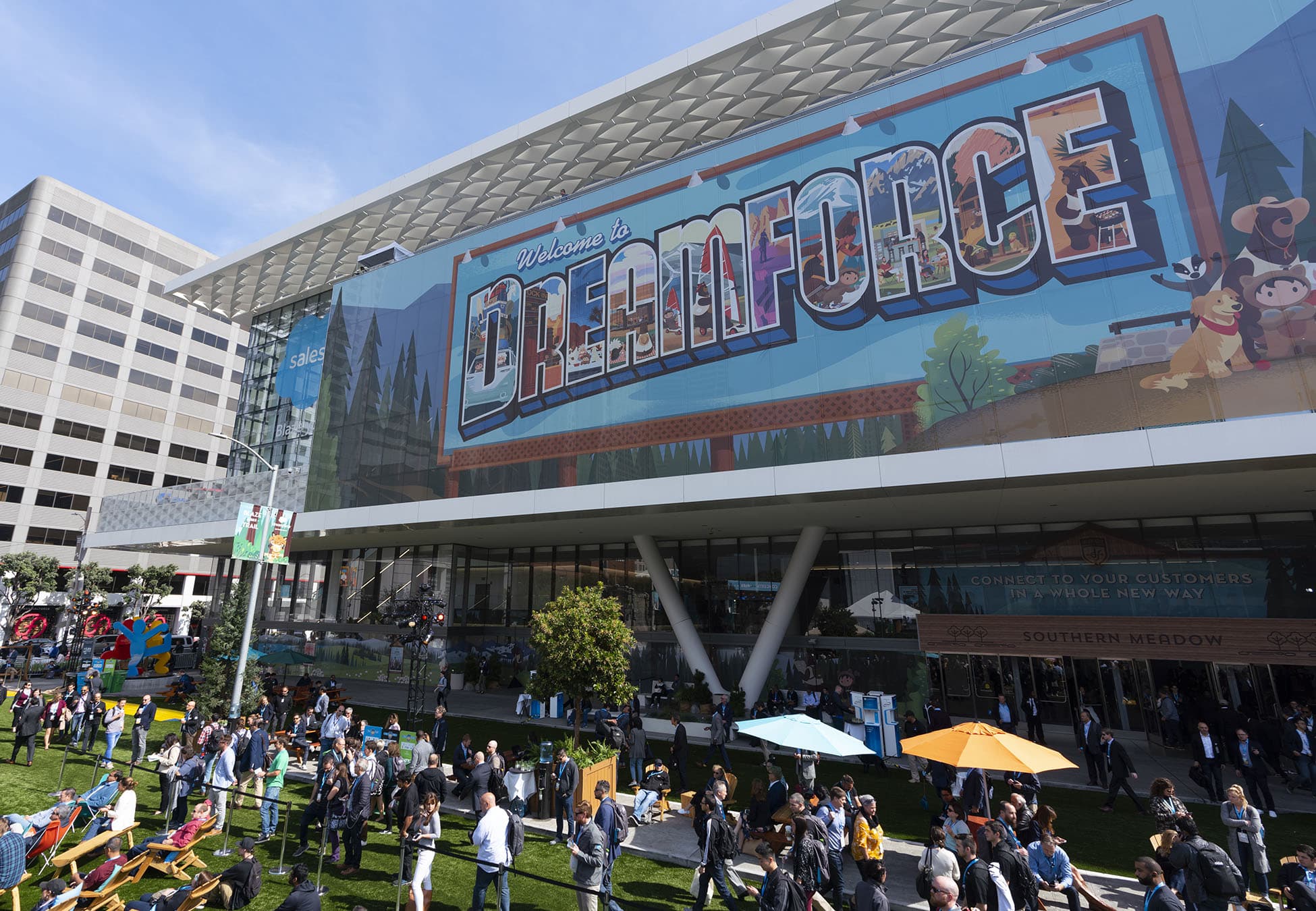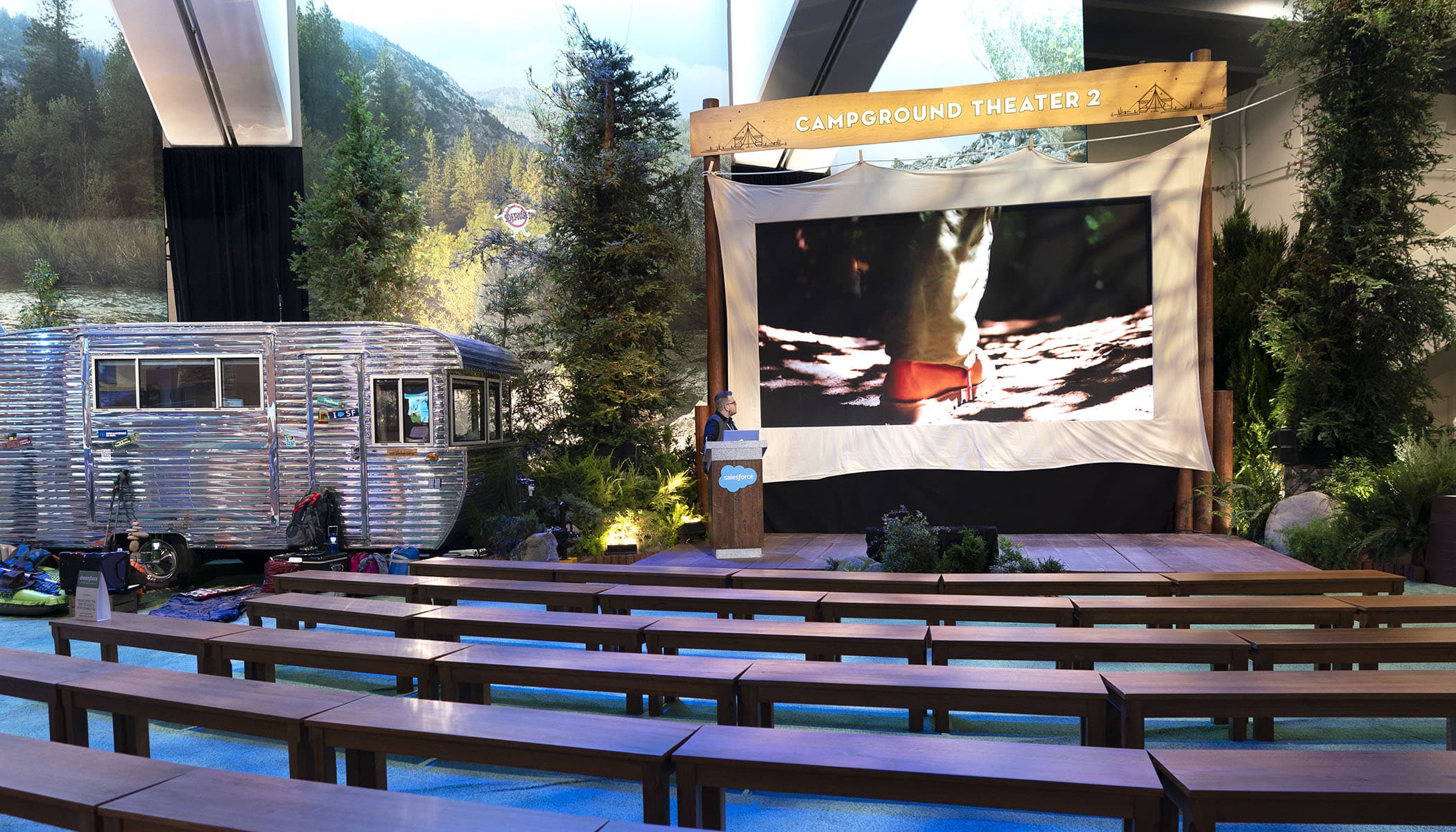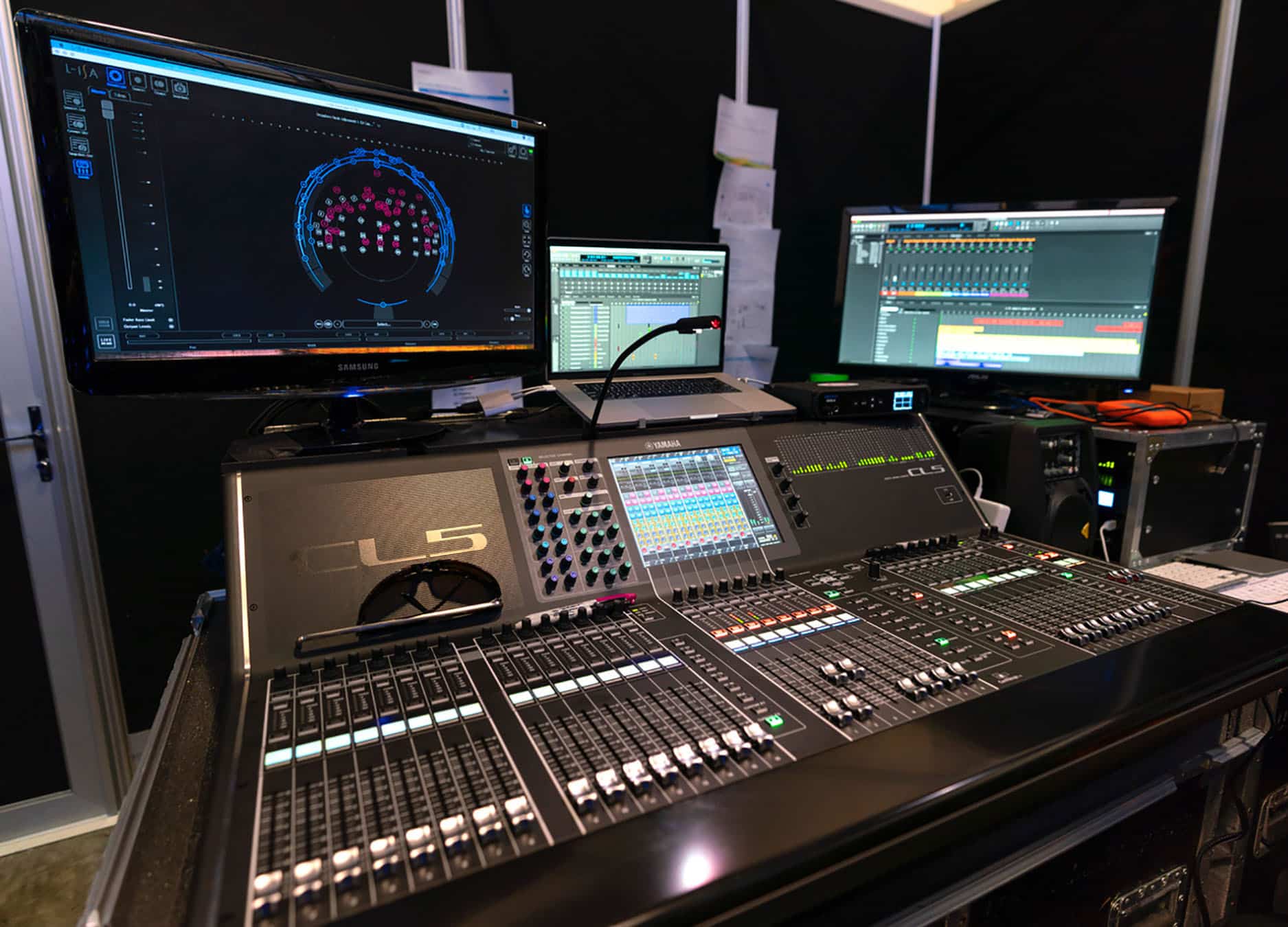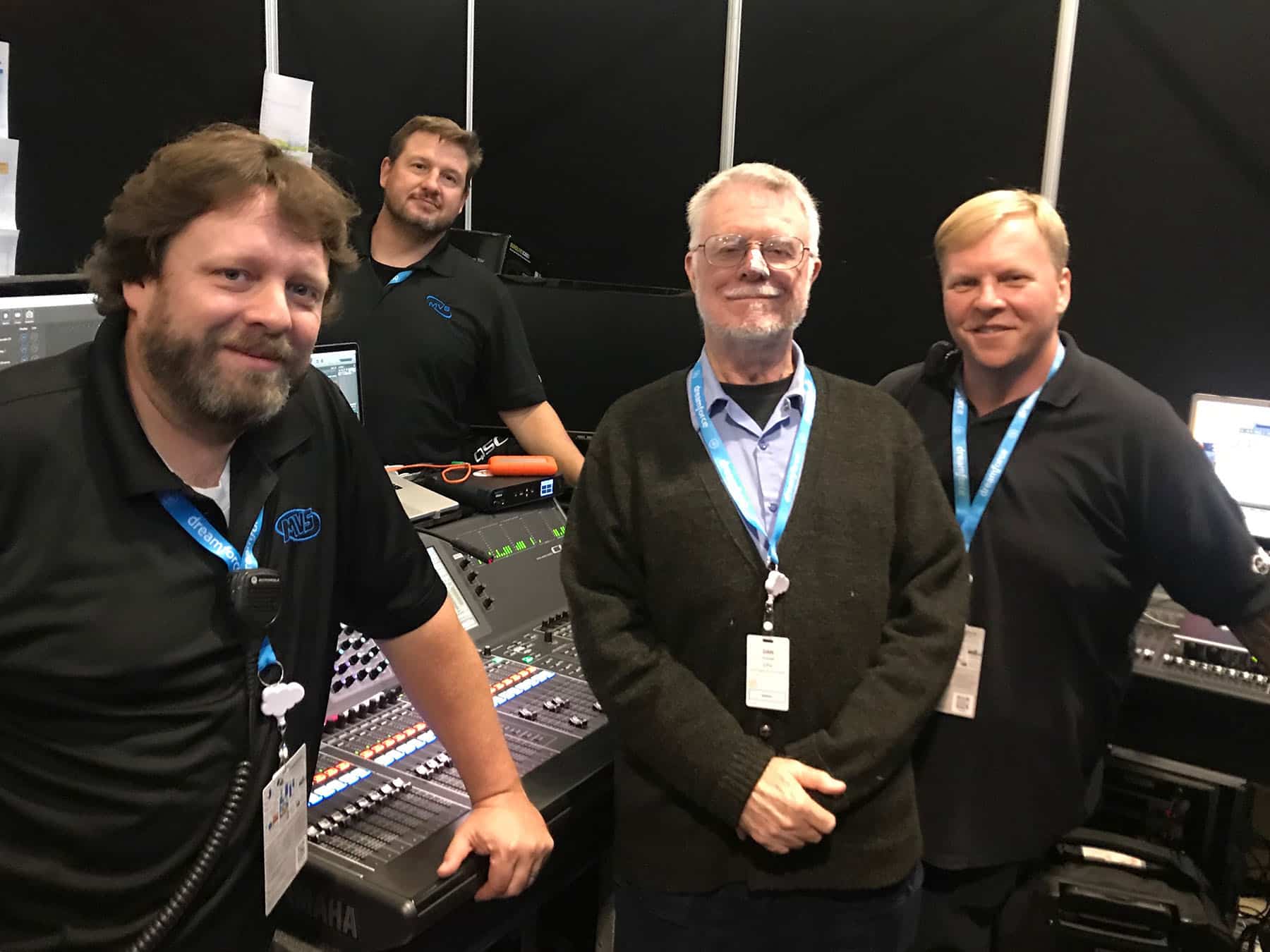Mountain View Staging deploys L-Acoustics’ immersive audio technology to create realistic soundscapes for Salesforce annual event
Creating a lasting impact for event attendees isn’t just about being loud. Any experienced audio engineer will tell you the real aim is to have balanced sound that enhances the experience and supports the client’s message. Most attendees only notice the impact of an audio engineer’s efforts when something is wrong, but what if new technology could help audio be as impactful and memorable as visuals?
Josh Conway from BigBoyNoise is on the leading edge of technology, attempting to create an immersive audio experience in a way never done before at one of the largest corporate events in the country, Dreamforce, in San Francisco, California. Dreamforce is the annual user conference for Salesforce, the largest client relationship management software company in the world, and it has always been a place to show off the latest technology for tech-savvy attendees who expect to be dazzled by the very newest and best in event technology. Utilizing new equipment at events of this scale with over 150,000 attendees always comes with risk, but the reward of providing a truly unique experience for the first time is huge.
The starting point for sound system design inspiration was the grandiose décor at the Salesforce Dreamforce gathering, featuring hundreds of live plants, giant trees, and nature scene murals covering convention center walls from floor to ceiling. The goal was to realistically replicate the sounds of nature to accompany this National Park-esque scenery. Recordings were specially created by Josh Conway to establish a foundation for the overall space. Using eight omnidirectional microphones in the Lovell Canyon just outside Las Vegas, Josh was able to capture two days of high resolution recordings that were edited down to an 11-hour timeline.
Additional live recordings were provided by audio legend Dan Dugan using four microphones with minimal processing to capture the sounds of the famous Mariposa Grove of Giant Sequoias in Yosemite National Park and the Dipsea Trail located within the famous Muir Woods National Monument located just outside San Francisco, complete with rushing water in a nearby creek, and bird calls ringing through the forest at the break of dawn. The remainder of the sound files included migrating birds in flight, wind moving through the venue, thunder in the distance, coyotes and wolves howling, as well as a few small aircraft flying overhead.
The sounds all had a sense of location in the air space overhead the expo area, seemingly coming from between the actual speakers. The sounds were designed with the venue layout in mind, matching the locations of a forest of computer terminals, LED walls and attendee traffic areas to sound effects such as a bird flying overhead, including movement, when relevant. Visual lighting “takeovers” included moving lights synchronized with the audio movement to simulate dawn several times a day, appealing to the senses of attendees to create the immersive experience of nature while walking around the expo space.
To create this perception of believable, three-dimensional nature for attendees, Conway needed multichannel audio mixing and processing technology that could truly envelop and immerse guests in the experience. L-ISA Immersive Hyperreal Sound technology by L-Acoustics, a market leader in premium sound reinforcement, provided the ideal solution. Whether for live events or installations, L-ISA enables accurate placement of sound objects in a space, resulting in increased clarity and accurate localization of sound. In other words, what you hear is what you see.
In a concert or performance context, vocalists or musicians can be heard and are perceived in connection with their actual physical location. This creates a greater sense of connection and proximity to the performance. In a context such as the imaginary nature setting of Dreamforce, L-ISA, combined with clever lighting and staging, helps create the illusion that attendees are fully immersed in the great outdoors. Following a couple of days spent in L-Acoustics’ studio in California with Josh Conway working on 3D audio content and getting familiar with the L-ISA interface, the design team was convinced that L-ISA was the solution to create a unique immersive experience.
According to Conway, the ability to spatialize audio in multiple dimensions enhances the experience significantly. He calls immersive sound design one of the biggest advancements in his 25 years of experience working live events. “It’s all-encompassing,” explained Conway. “It’s blending between multiple speaker zones to where you don’t get that hot spot of walking in and out of a speaker zone because the blend is so smooth all the way across. The sound system goes away and it just becomes a natural ambient sound.”
The L-ISA deployment at Dreamforce was unique. Marcus Ross, Head of Application, Touring for L-Acoustics, who was onsite to provide operational support expressed, “It was interesting from a both a technical and creative perspective to see L-ISA used in this fashion. It’s a departure from what might be considered our typical deployment for live performances but opened a lot of ears and brains to the tremendous possibilities of L-ISA for creative sound design of immersive sonic environments. The L-ISA Controller, used here to position, automate, and move sounds, greatly simplified the implementation and operation of what would have otherwise required a very complex setup.” Ross was highly impressed with the immersive atmosphere that was achieved, noting, “There was authentic depth and dimension to the recordings that made the expo hall audio sound rich and lifelike.”
In addition to the L-ISA Controller and the L-ISA Processor for object placement and spatialization, the L-ISA configuration at Dreamforce comprised a Frontal System of 12 arrays of six Kara each located in front of the projection screen with low-end frequency reinforcement provided by four SB18 subs flown in the center of the exhibit space in a block configuration. A total of 25 X15 HiQ coaxial loudspeakers distributed throughout the venue provided the overhead coverage that enabled seamless delivery of nature sound effects. The entire system was powered by 25 LA8 and two LA12X amplified controllers.
Laurent Vaissié, CEO of L-Acoustics USA and Canada, sees corporate event production as a key application for multichannel sound, and specifically L-ISA, in the future. “L-ISA makes a lot of sense from a plenary speaker localization and intelligibility standpoint to creating an immersive environment or enhancing a dramatic product release with 3D sound effects,” said Vaissié. “L-ISA’s intuitive mixing tool and comprehensive ecosystem also cuts down production preparation time substantially for complex corporate shows such as Dreamforce.”
Conway was working with leading audio-visual production company Mountain View Staging on this project. MVS has been on the cutting edge of advancements in the visual and audio aspects of events for many years. MVS and Conway are both experienced in the fact that event planners are less aware of the potential to combine new audio technology like L-ISA to enhance and support the visuals.
“One of things I like about partnering with MVS on this is being able to tie in all the visuals,” said Conway. “In previous designs, the sound doesn’t move. Now, with this, we can custom tailor our sounds to follow those graphics and we can move it into a 360 realm of encompassing the entire audience. This allows us to be a lot more impactful with our message. It also allows sound to become more of the design from the forefront as opposed to an afterthought.”
Every L-ISA sound system design is unique to what the client wants it to be, limited only by imagination. To make the most of L-ISA’s creative possibilities, audio can be specifically recorded to take advantage of the technology’s multichannel and multidimensional placement capabilities. Conway worked using the L-ISA Controller, an intuitive graphic user interface that controlled the location of each sound in real time. A given “sound object” could be moved across the screen to mimic how a bird might move in nature, thus giving a dynamic, hyperrealistic feel to the recordings from Yosemite.
“This is going to be a totally new way of doing things. You’re going to walk into a venue and as soon as you walk through the door you’re going to notice that something is different,” enthused Conway. “The sounds are going to be moving around. The visuals are going to be moving around.”
Mountain View Staging Audio Systems Manager Chris Kaletta was working with Conway on the system for Dreamforce as the overall lead for the audio production and had some insight regarding the impact the system created. At one point during setup and testing the L-ISA system was turned off temporarily. The difference, according to Kaletta, was night and day.
“It was immediately noticeable that it was normal audio again and went from nature all around to there’s a speaker and there’s a speaker,” Kaletta said. “It sounded terrible in comparison, but this is how it had been done in the past.”
As is the case with many advancements in technology, it seems the only disadvantage of immersive audio may be that once it has been used to provide more natural, balanced and location-specific audio, everything else may appear to be a step backward in sound quality.
If you would like to experience L-ISA Immersive Hyperreal Sound in person, L-Acoustics is partnering with Aerosmith and THX on the upcoming Las Vegas “The Deuces Are Wild Residency” starting in April of 2019.



